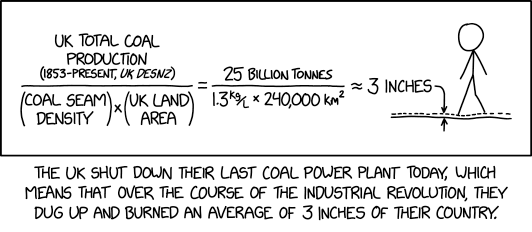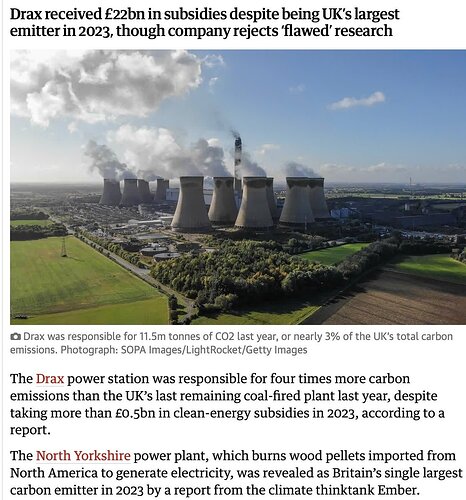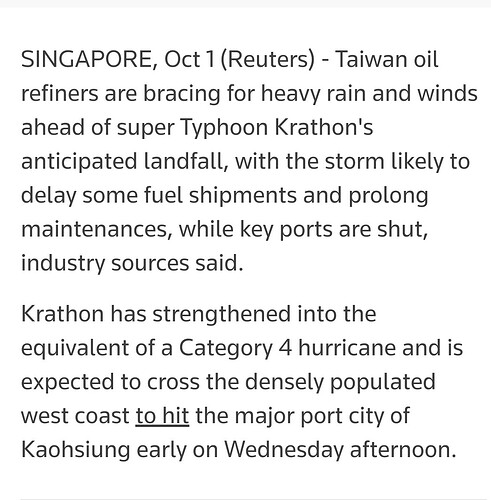We have entered the climate chaos phase of climate change. No more “death by a thousand cuts” as the weather events get more and more extreme.
There’s a logic flaw there. Wood comes from trees. Trees come from CO2. So burning trees for power is net neutral. This isn’t a difficult concept, so whoever did that report is either deliberately misrepresenting things or is next level biased.
Same as when people get all worried about bushfires releasing CO2. It’s just an aspect of the carbon cycle. It’s adding additional fossil carbon that’s the problem.
This all being said, the whole idea of importing wood from overseas to burn brings a massive transportation energy cost, so this isn’t completely carbon free. Add to that the costs of what I expect is a costly fuel source and the environmental impact of logging, I can see a number of legitimate ways to question that project.
It takes something like 50 years for forests to reabsorb that CO2. And wood emits more CO2 than coal per kWh iirc.
Apart from that, deforestation is a Climate Change issue, particularly for the world’s lungs in the Amazon. While the Amazon is mostly problematic from land clearing there, deforestation in Africa for fuel has been an ongoing concern. There is also the issue of environmental pollution, as with wood burning heaters. That’s a problem for Indian use of cow dung as fuel.
There was a fad for biofuel generation of power a couple of decades back when peak oil was believed to be the big problem rather than climate change.
Burning wood for power in the modern AGW-blighted world is all kinds of crazy though. It’s just unfossilised fossil fuel, after all.
Taiwan’s turn.
Do you just make ■■■■ up bro?
Interesting article. You can be polite and have a discussion, rather than open fire and put the other person on the defensive.
I stand by what I wrote.
I pointed out that the supply chain is a problem and that the environmental impact of the logging industry is the weakness of using biofuel. The main reason I don’t personally advocate for using biofuel at scale is the land use problems it encourages, like clear felling and replacing food production with energy crops. But to my key problem with the carbon emissions report, your article explicitly says that the carbon released ends up being reabsorbed by the regrown forest.
You can fairly say that the decades that the carbon is in the atmosphere is a problem and that the industry is being run by cowboys. But no, I don’t just make ■■■■ up.
What a signpost
Helene is by no means the first hurricane that DeSantis has had to navigate during his second and final term as governor. But the Category 4 storm is the first major hurricane DeSantis has confronted since his short-lived — and failed — bid for president. It’s also the strongest hurricane on record to ever make landfall in the Big Bend region. With just two years left in his term and another presidential run in the future likely, how DeSantis responds to Helene could make a big difference in whether he can shore up the Republican nomination for 2028.
Which may explain why, at one of the governor’s first public appearances following the storm, he dodged questions about the role of climate change in driving more frequent and intense hurricanes to the region. This approach is clearly at odds with his messaging to date on the subject. Earlier this summer, not only did he pass legislation that deletes most climate change references from state law, scrubbing emissions reduction goals from energy policy, and prohibiting local governments from limiting the use of natural gas, among other anti-mitigation measures, he has repeatedly denied that human-caused warming is making hurricanes stronger. In fact, after 2023’s Hurricane Idalia, he told Fox News that “they act like this is somehow unprecedented. And it’s not.”
“I wouldn’t hazard a guess as to why the storms, you know, have come here in the last year and a half or so,” said DeSantis in a press conference Saturday at Dekle Beach. “No one asked to be put in this situation. You know, I don’t have any explanation as to why we would have storms that would track into this particular part of Florida over a year and a half period. But what I do know is there’s work to do. And so we’re going to get back into the business of doing it.”
what an absolutely ■■■■ that man is
@Benny40 is one of the good ones. knows the science, knows the tech and is fighting the good fight
There will be a point when it is going to be impossible to deny and then there will a lot of people running around saying why weren’t we warned.
But that has happened, and the snowballing of the greenhouse effect means it’s far from status quo.
(More greenhouse gases = hotter & more extreme weather = more bushfires = more carbon released = more greenbouse =…)
You can’t make a blanket statement about it being net zero without the numbers
EDIT: like - which trees? Where are they from? How much energy did it take to get them from point A to B? How efficient are they to burn? How much CO2 would they have removed if left? Etc etc etc.
These can’t just be assumed that same=same.
I’m more than comfortable to say that vegetation fires don’t have an impact on the long term atmospheric CO2 levels. There might be a very small short term impact while the plant life grows and reabsorbs the released carbon, but that is dwarfed by other man made emissions.
As for snowballing… dunno man.
To be clear, what I was trying to say is that while I’m not a fan of biofuels, it’s not valid to treat the carbon emissions from burning wood as equivalent of the emissions from burning coal, oil or gas. That’s just fundamentally logically wrong and there’s many other very valid reasons to attack the biofuel industry. Like the transport costs you point out and the local environmental impacts of logging.
Of course it does - how could it not? Depending on who’s numbers exactly, 3-7% of global emissions.


